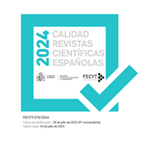Teoría lingüística y enseñanza-aprendizaje de ELE: análisis metodológico, terminológico y conceptual del futuro simple de indicativo
Resumen
El objetivo de este artículo es analizar el tratamiento que recibe el futuro imperfecto de indicativo (forma cantaré) en un corpus constituido por veinte gramáticas de español como lengua extranjera (ELE) de distintos niveles y lenguas publicadas entre 1957 y 2015. Estudiamos, de forma específica, la complejidad explicativa y descriptiva del futuro en español, el marco teórico del corpus, la terminología empleada por los autores para denominar a la forma cantaré, los valores atribuidos a esta forma, las explicaciones didácticas empleadas, la oposición con otras formas del sistema verbal español, así como los ejemplos que utilizan los autores para describir el futuro. El artículo pretende, además, poner de relieve la necesidad de tener en cuenta la teoría y metodología lingüísticas en la praxis de ELE, con el fin de lograr un mayor aprovechamiento pedagógico.
Descargas
Descarga artículo
Licencia
La revista Círculo de Lingüística Aplicada a la Comunicación, para fomentar el intercambio global del conocimiento, facilita el acceso sin restricciones a sus contenidos desde el momento de su publicación en la presente edición electrónica, y por eso es una revista de acceso abierto. Los originales publicados en esta revista son propiedad de la Universidad Complutense de Madrid y es obligatorio citar su procedencia en cualquier reproducción total o parcial. Todos los contenidos se distribuyen bajo una licencia de uso y distribución Creative Commons Reconocimiento 4.0 (CC BY 4.0). Esta circunstancia ha de hacerse constar expresamente de esta forma cuando sea necesario. Puede consultar la versión informativa y el texto legal de la licencia.











